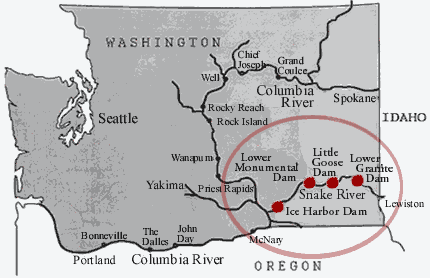forum
library
tutorial
contact

If Dams Go, Then What? Saving Salmon,
Power Grid Means Finding Answers Now, Leaders Say
by Rocky Barker
Tri-City Herald, July 16, 2021
|
the film forum library tutorial contact |

|
If Dams Go, Then What? Saving Salmon,
by Rocky Barker
|
 Two of the key players in the Northwest debate over breaching four dams to prevent Snake River salmon from going extinct say it's time to identify how to replace the power from the four dams and other services, such as grain shipping.
Two of the key players in the Northwest debate over breaching four dams to prevent Snake River salmon from going extinct say it's time to identify how to replace the power from the four dams and other services, such as grain shipping.
Washington Gov. Jay Inslee and a spokesperson for U.S. Sen. Patty Murray of Washington, both Democrats, told a summit of Northwest tribal leaders earlier this month that they essentially want to ask the "what if" question. That's the question Idaho Republican Mike Simpson asked at a 2019 Andrus Center for Public Policy conference that led the longtime U.S. representative to propose a $33.5 billion plan to remove the dams, replace the power and keep farmers whole.
"We should be committed to getting down to business to determine what can provide the services these dams provide, so we can define how to replace these services so we can build support in our communities for taking the next steps in the dam breaching discussion," Inslee said.
Inslee and Murray's initiative couldn't come soon enough, in the eyes of dam breaching supporters. Sockeye and summer chinook are migrating right now up the Columbia and Snake rivers through deadly hot water as they try to return to their spawning streams. And the state of Oregon, the Nez Perce Tribe, and a coalition of fishing and conservation groups on Friday filed a demand for injunctive relief in a longstanding lawsuit calling for expensive measures to help salmon get through eight dams between Idaho and the Pacific Ocean.
Simpson's bold comprehensive proposal has had support from Oregon Gov. Kate Brown and U.S. Rep. Earl Blumenauer, both Democrats, but has not been considered for President Biden's Build Back Better Plan for infrastructure. But it has strong support from the region's Native American tribes and even national tribes. The Biden administration has not yet commented on the Simpson plan.
Liz Klein, senior counselor for Interior Secretary Deb Haaland, attended the summit and expressed support for the tribal cause.
"We share the concerns of many that salmon and steelhead species that rely on the Columbia and Snake River systems for their survival continue to experience serious declines," Klein said in a statement to the Idaho Statesman. "Rebuilding sustainable stocks of these populations is critically important to multiple tribes in the region, whose existence is intrinsically tied to salmon and steelhead.
"We are committed to working with our partners and stakeholders in the region toward a comprehensive solution."
The Biden administration decision regarding the four dams isn't only about infrastructure bills. The ongoing litigation surrounding the biological opinion for the Columbia River presents a major threat to ratepayers of the Bonneville Power Administration, which supplies 28% of power to public utility customers throughout Idaho, Oregon, Washington and Montana.
The federal agencies that control the dams completed a court-ordered environmental impact statement in 2020, but they used rules generated by the Trump administration that raise new issues in court.
The Biden administration has already backed out of the clean water rules and is expected to reject the National Environmental Policy Act rules under which the impact statement was written. The federal dam agencies have been unable to write a legal plan since Idaho and then-Gov. Cecil Andrus began a series of lawsuits in 1993.
The injunctive relief sought by Oregon, the Nez Perce and environmentalists could add millions of dollars to the costs of the federal dam operation as early as January, if it is granted by U.S. District Judge Michael Simon. The group asked Simon to increase the amount of water required to be spilled over the dams and away from electric-generating hydro turbines. It also asked the judge to order dam managers to lower reservoirs during hot weather to make it easier to reduce river temperatures.
Water temps in the Snake River have climbed as high as 74 degrees recently; salmon can start to die off when they hit 68.
The federal government is supposed to respond to the injunction request by October, with Simon expected to rule in December.
The plaintiffs also are asking the Biden administration to stop the federal government from fighting them in court. They urged the administration to build on the work done by the Affiliated Tribes of Northwest Indians and Simpson.
"What we need to stop this extinction crisis in our backyards is leadership from the Biden administration," said Todd True, attorney for Earthjustice, who represents the groups who filed the lawsuit.
learn more on topics covered in the film
see the video
read the script
learn the songs
discussion forum
